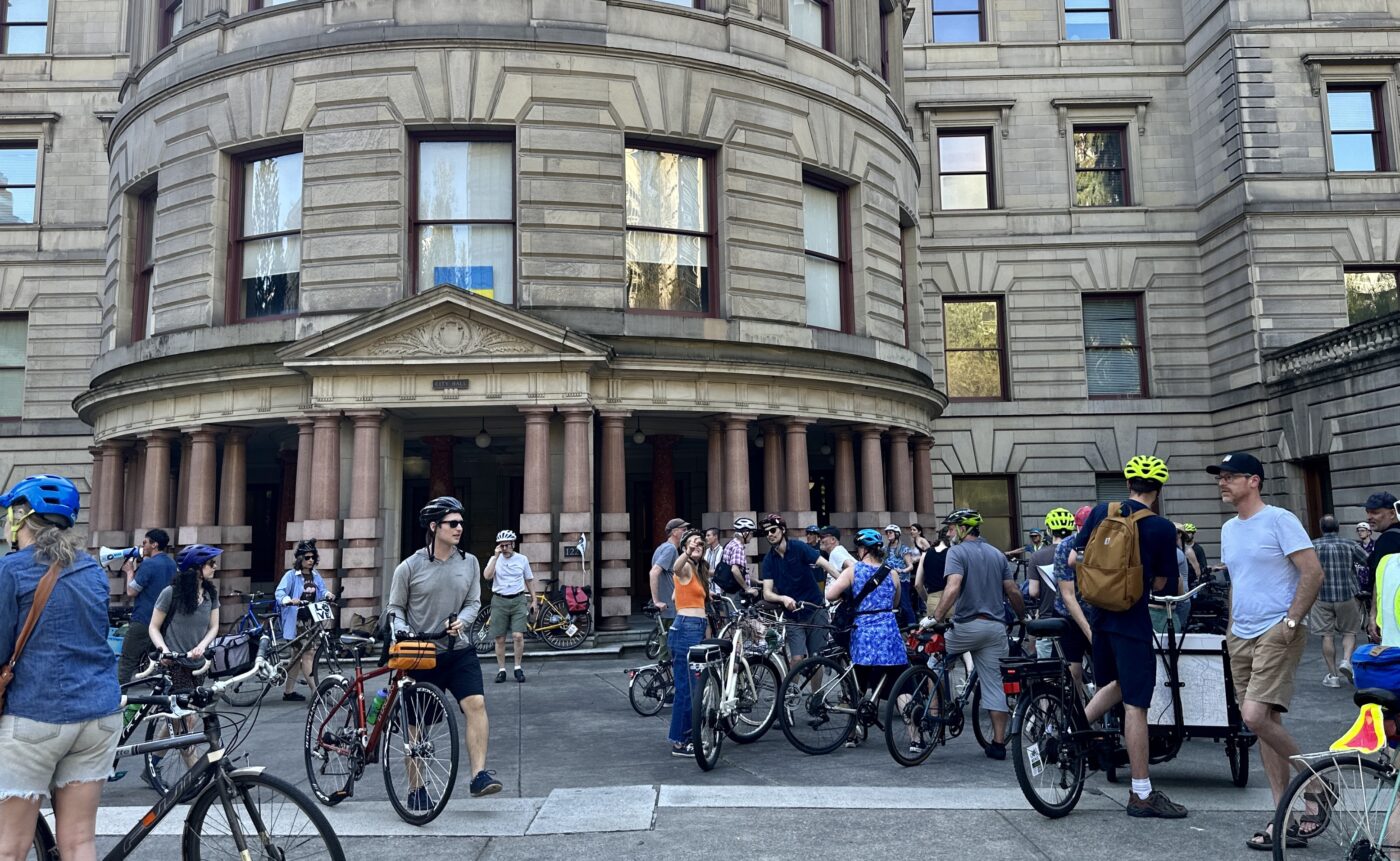
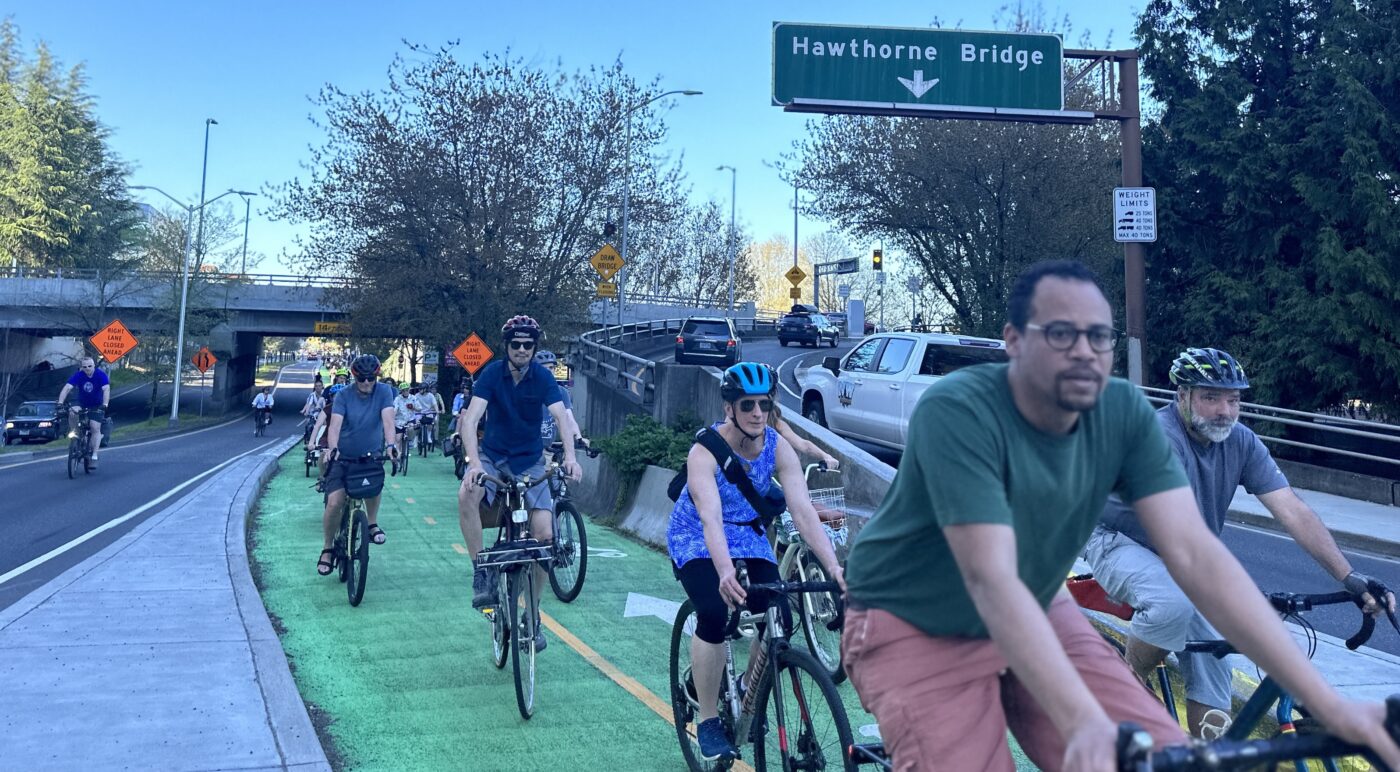
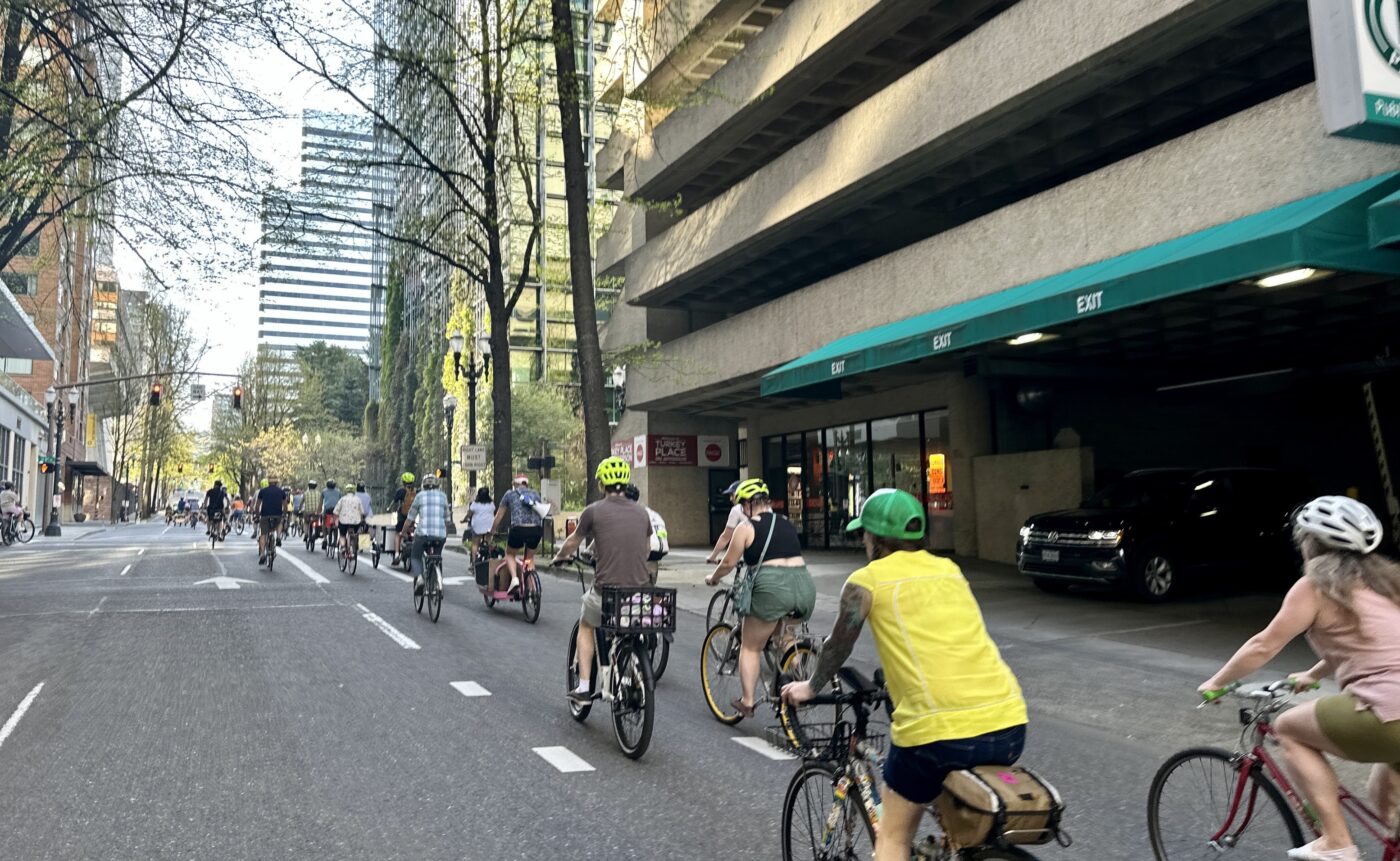
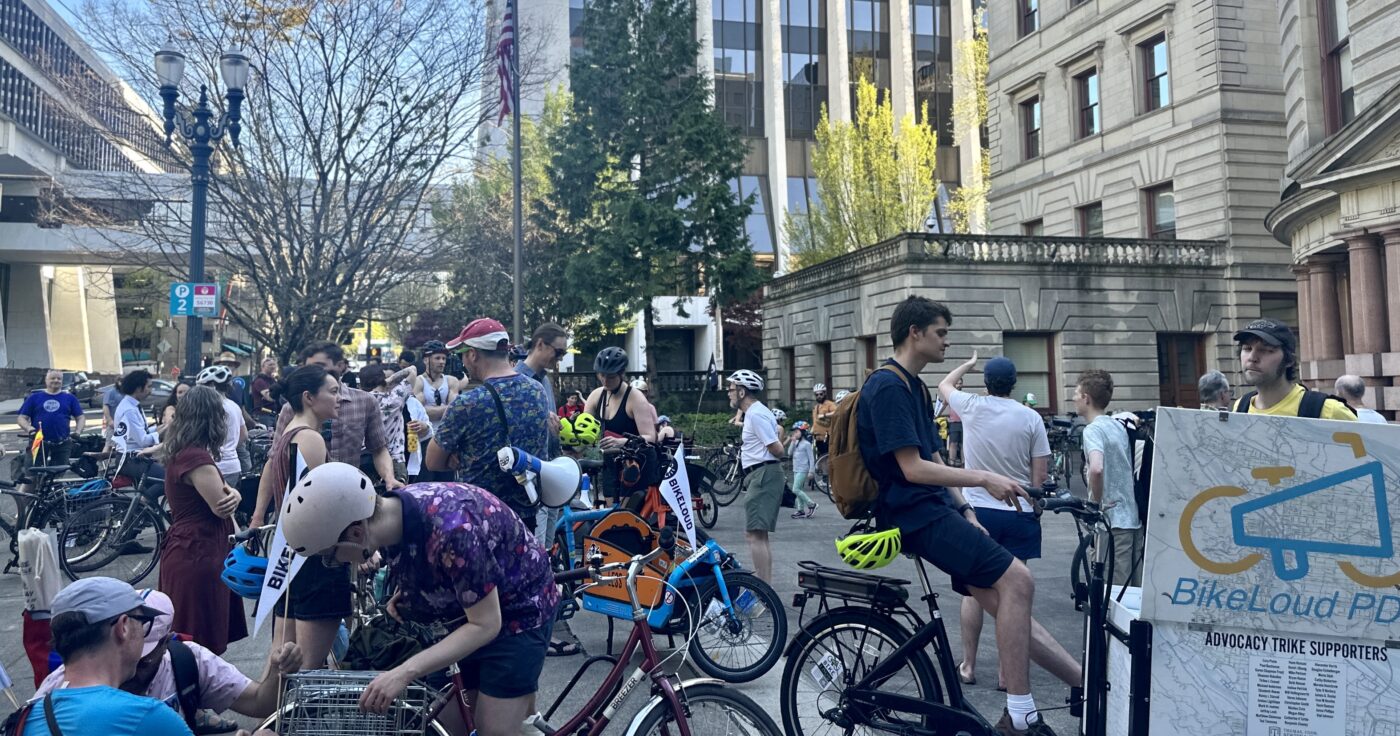
Last Friday afternoon, Portland bike advocacy nonprofit BikeLoud PDX held their first big rally in more than three years. The message? Although a recent report shows bike use is down in the city, bikes are still the future in Portland. And advocates will keep spreading the word until people at City Hall listen.
Friday was unseasonably sweltering, with temperatures getting up to 90 degrees in some parts of the city. But after months of seemingly-endless winter, it’s clear that people are raring to get outside. I saw lots of other people riding bikes on my way down to the Salmon Street Springs to meet the group, and as I pulled up to the meeting spot, I saw several dozen people already there. This number grew to about 100 for the ride to City Hall.
Before we left for City Hall, BikeLoud board members Nic Cota and Kiel Johnson spoke to the crowd.
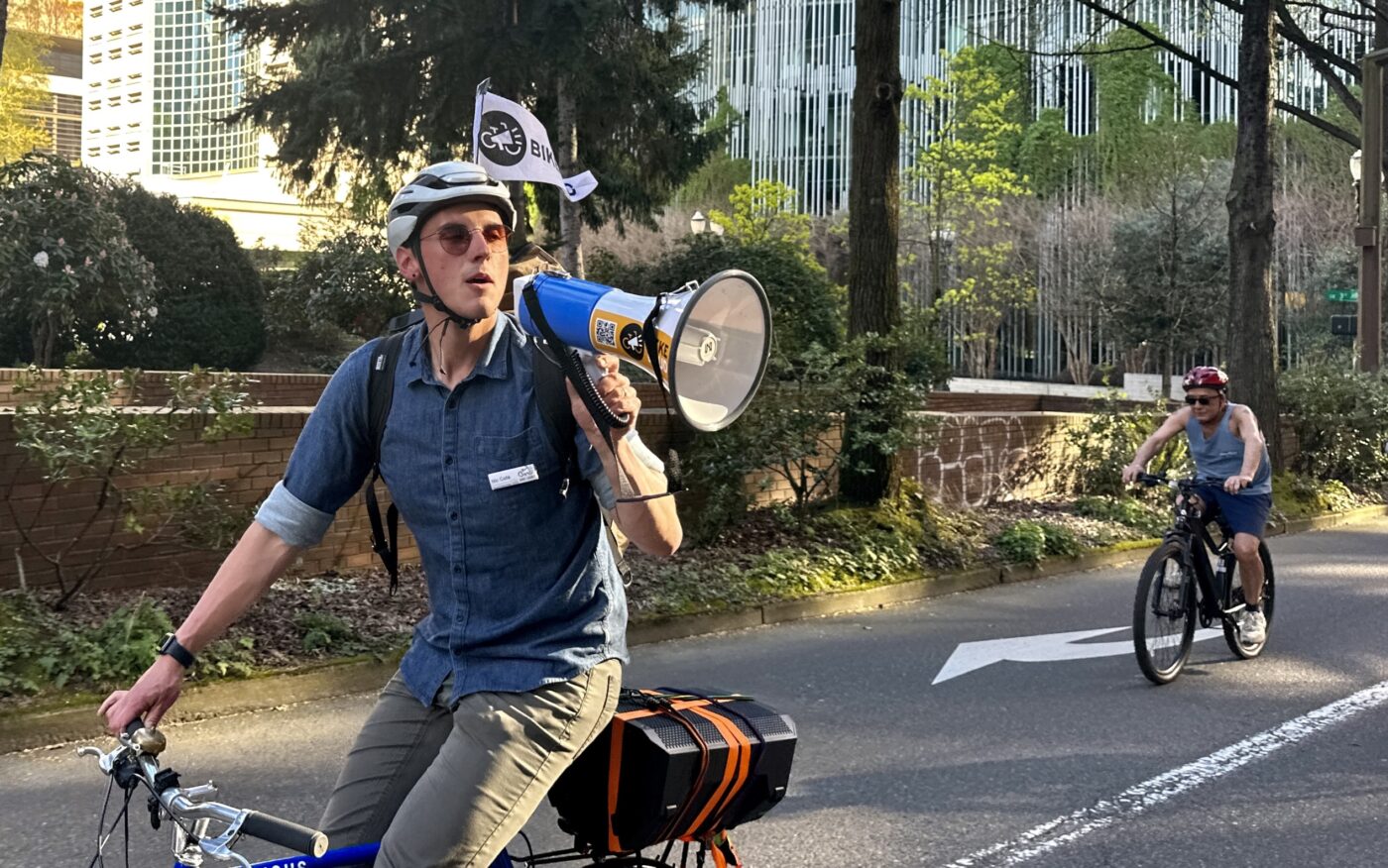
“We’re here to hold the city accountable… It feels like a statement to ride a bike in Portland. It shouldn’t feel that way.”
– Nic Cota, BikeLoud PDX
“We’re here to hold the city accountable and get people from all walks of life biking in this city,” Cota said, as leader of the rally the day after he was named BikeLoud chair. “It feels like a statement to ride a bike in Portland. It shouldn’t feel that way.”
Johnson, BikeLoud’s former chair, was initially hesitant about the idea of holding this kind of event. But once he was there, his mood shifted.
“We’re gonna keep on being loud until everybody in Portland has access to protected bike lanes like Better Naito,” Johnson said to the group, gesturing to Portland’s marquee protected bikeway behind him.
When we headed off to City Hall, the group of people on bikes filled up SW Jefferson Street. A few people in cars honked approvingly and were met with cheers in return. Once we arrived at City Hall, a few other speakers got up in front of the group to share why they wanted to come to the rally.
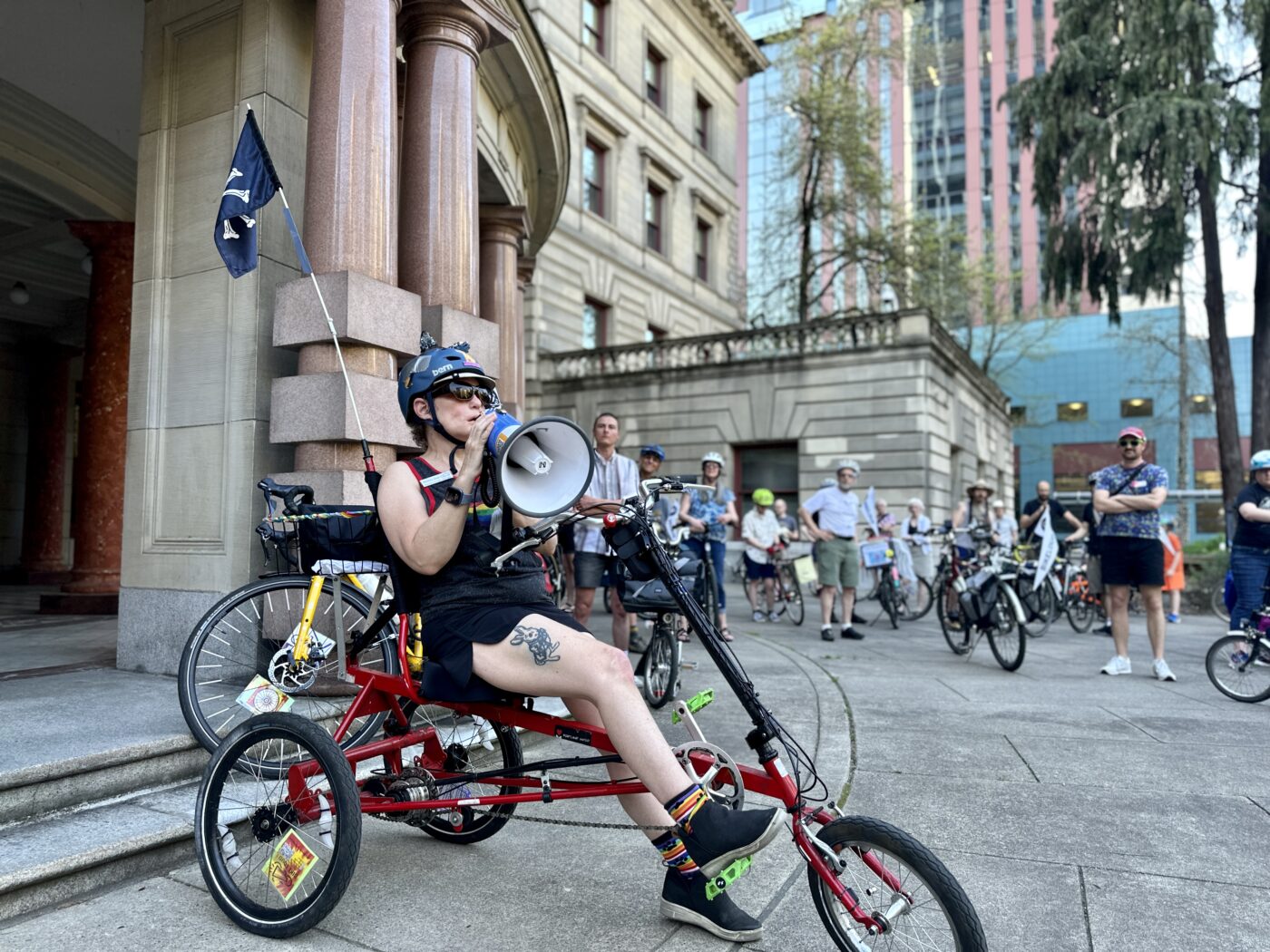
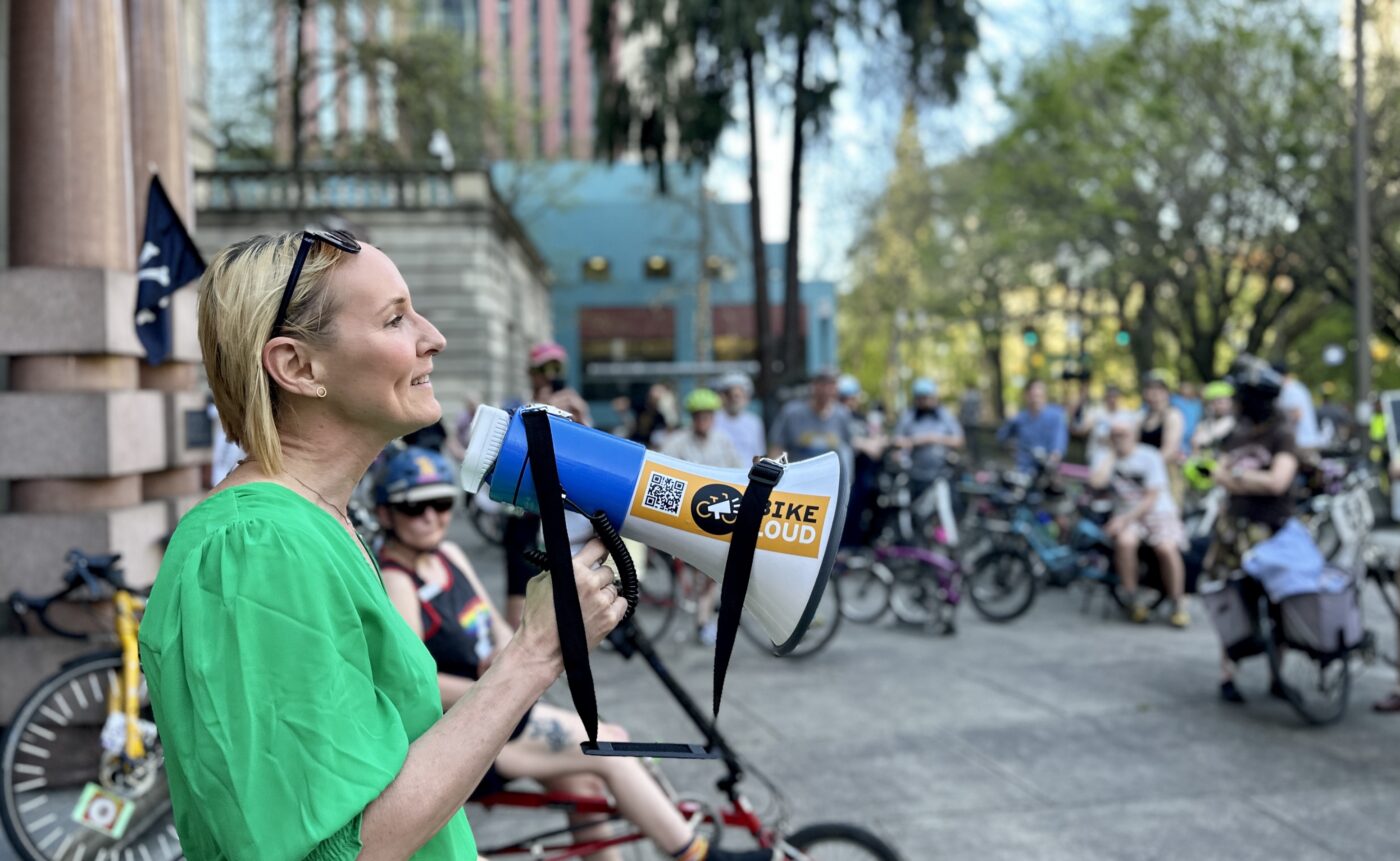
First, Serenity Ebert, BikeLoud’s Vice Chair, took the megaphone. Ebert rides a recumbent tricycle to accommodate her disability, and she said she wants everyone to be able to get around the city safely.
“You have a friend in City Hall. My boss is listening to you.”
– Shannon Carney, Commissioner Mingus Mapps senior policy advisory
“Biking has given me a lot of freedom to do whatever I want,” Ebert said. “I would like everyone here to be able to ride a bike if they want to.”
We then heard from Shannon Carney, Commissioner Mingus Mapps’ liaison to the Portland Bureau of Transportation. Carney said she’s a longtime cyclist who currently commutes by bike to City Hall the majority of the time, and she said she and Mapps both support the work BikeLoud is doing.
“There are so many challenges that our city faces that transportation can help solve,” Carney said. “You have a friend in City Hall. My boss is listening to you.”
Some people weren’t happy about Carney’s invite: one person booed when she took the stage, calling Mapps out for his recent controversial attempt to divert money away from a Black-led organization.
Depending on how and if Portland officials move into action on this issue, it’ seem’s possible splits could emerge among activists who want to take different approaches to how they deal with institutional power. But ultimately, many are simply trying to use the relationships they do have in City Hall in order to get their ideas implemented.
Overall, organizers deemed the rally a success. The event garnered TV news coverage, which inevitably led to some trolling commentary from people with no involvement in the situation, but also added more legitimacy and publicity to the gathering.
As I biked away from the last event I’d cover as a BikePortland reporter, I felt hopeful. There were tons of people riding their bikes around the city who hadn’t come to the rally, and while their support would’ve been appreciated, it was also kind of cool to me that these people were out there doing their own thing, regardless of what bike count reports say. The Portland bike scene takes all types: the rally organizers, the Pedalpalooza fanatics, the prolific BikePortland commenters and the people who’ve never heard of this website before. It’s bittersweet to leave BikePortland right as I feel a spark in the air, but I look forward to seeing what happens next.



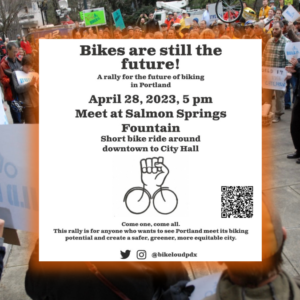
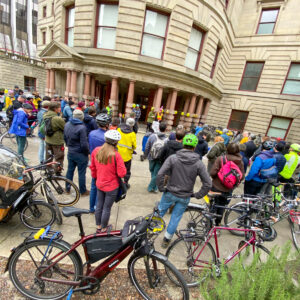
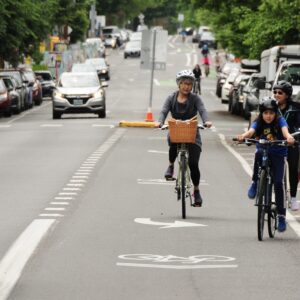

Thanks for reading.
BikePortland has served this community with independent community journalism since 2005. We rely on subscriptions from readers like you to survive. Your financial support is vital in keeping this valuable resource alive and well.
Please subscribe today to strengthen and expand our work.
I love this, Taylor! Thank you.
Gonna have to make our city safer again to get a wider buy in on cycling in Portland. I’m afraid many activists don’t realize how dangerous MUP’s (inhabited by sketchy people) and the lack of traffic enforcement has made Portland an unwelcome place to jump into cycling. It’s gotta be clean, safe and fun to get people to join into a transportation modality that is less protected than an automobile.
While I agree we need the MUPs to feel safer, I don’t think that’s really a barrier to getting people to bike as transportation in Portland. Most routes for actually replacing car trips don’t go somewhere that would use a MUP (or don’t need to). Commutes, shopping, errands, etc, all basically go where roads go, and we need protected bike lanes there. I suppose that is also “making our city safer”, but not in the same way.
There are also many activists who lives by those trails, and know exactly what they are like.
So so white in yer photos: Apparently the population of Portland is becoming far more racially diverse, over 30%, than those who will participate at a downtown bike rally (maybe 5%?). Would there be a different result if it was held at 122nd & Division, or is it the same group who shows up at every event like in most cities?
Correction David.
Portland OR is 73.8% White. What’s Greensboro, NC (your city) and what’s the racial makeup of bike riders there?
https://www.census.gov/quickfacts/fact/table/portlandcityoregon/AGE295221
It’s based on 2020 census data for Portland: https://en.wikipedia.org/wiki/Portland%2C_Oregon (it includes Hispanic White)
300K Greensboro is 39% white (including immigrants and European migrant workers) and 42% African-American or African immigrant; about 55% of our bicyclists are African-American according to our city officials, mostly students, staff and faculty at our two public universities. When we have our annual Ride of Silence every mid-May, we get 200+ bicyclists, of whom typically about a third are African-American. Our bike mode share is a rapidly-rising 0.2%, unlike Portland’s rapidly-declining 2.8%. We were the first city to have Limebike in 2017, but our current bikeshare and scootershare company is the awful BlueDuck. For a bike to get stolen here, you need to leave it unlocked on your front lawn or porch for at least two weeks – most folks still use combo cable locks. We have about 20 miles of disconnected paved trails and 80 miles of officially city-sanctioned mountain bike dirt trails, and about 50 feet of candlestick-protected bike lanes, plus lots of miles of the useless painted kind.
We finally opened our first community bike shop a year ago, in the poorest part of the city (I had a big hand in it): https://bikesboroorg.wixsite.com/bikesboro/bikesboro-bikecoop
0.2% is a rounding error. About 500 people total, in the entire community?
Before 2017 Greensboro had about 300-450 total for work commuters (0.1% mode share or so), with about 75,000 bicycles in the community – most bikes were ridden maybe twice a year if at all, but then why would anyone want to ride a Magna or Next anyway? But Lime came in June 2017, then Bird, the pandemic and eventually Blue Duck, and we’ve since seen a surge in numbers of work commuters by bike as well as the recreational sort, so yeah, it may be up 600 now (0.002 x 300,000) or even higher.
The nice thing about living in a community with such pathetic small numbers of bicycle commuters is you tend to not get your expectations dashed when 20-30 people show up for a rally or a community bike ride. We have a Bike Month rally this evening at City Hall, including a resolution sponsored by our city DOT supporting bicycle use – I’ll be amazed if more than 10 bicyclists show up. When we next have our Ride of Silence on Wednesday May 17th we’ll likely have 200-300 bicyclists, including about a quarter of all our bike commuters there along with many hard-core road riders, the huge Major Taylor bike club in brand new jerseys (a mostly African-American club of urban professionals, they make a new custom jersey every month), a number of inner-city kids who refuse to wear helmets or obey basic traffic laws, a dozen police on bicycles enjoying themselves, and numerous community riders who take the event wayyy too seriously.
It’s not the Bridge Pedal with 28,000 participants – it’s a lot more low-key and a lot more fun than that – it’s more like what Portland used to be in the 80s and 90s before the city got so big.
sounds dreamy David. And it’s what is possible when bikes aren’t really on the political radar of a city and don’t have the vast legacy they have in Portland. Enjoy it while you can! Because as things grow, so do expectations and political baggage, and controversies, and so on.
Nothing much to add other than an attempt to show how Portland does get it wrong. More important than (supposedly) protected bike lanes are linked bikeway systems. Where might a 3-wheel 2-way truck bike corridor be located? What cross corridor bike 2-way or couplets make sense?
Last note: The RoseQ I-5 project as proposed must be rejected! damnit. Induced Demand plays less a role for its rejection than demonstrable traffic hazards, accident rate and severity worsen. ODOT and other agency leaders are intentionally concealing these facts from the public. They know for a fact – accident rate and severity worsen (more multi-car pileups, more injury and fatality). The latest relocation of the Southbound exit is atrocious engineering.
I celebrated voter rejection of the SW Corridor MAX extension. It met NONE of the basic metrics that determine merit, not even close. DIVEST DAIMLER
First off, the racial makeup of rally-goers is irrelevant, as is the racial makeup of overall regular bike riders in the city. I’d rather live in a city that had a bike mode share of 25%, 100% of whom were white, than a city with a 2-4% mode share, 30% of whom were non-white. Of course, if Portland ever did manage to get to 25% mode share (a pipe dream to be sure), I’d expect the racial make up of riders to be closer to the overall racial make up of the city.
Secondly, I take your point about the same group of people attending these sorts of rallies. There’s probably some truth to that I suspect. I went on a lark because another parent at my kid’s school invited me that day, noticing that I frequently pick up my kid by bike. I’d never been to one of these rallies before. Everyone was chill and were there to enjoy one of the first great weather days of spring.
We met at Salmon Street Springs, where there was a fair number of kids running around in the fountain, most of them happened to be black. I overheard their families speaking Somali and others speaking Spanish. This matters, because in a city as white as Portland, people from diverse backgrounds still feel safe to mingle in the heart of the city with their families. The kids all seemed to enjoy all the bikes and were curious why we were all getting together.
Anyways, Portland really does not need to constantly apologize or shame itself for its racial makeup. We need greater numbers of frequent bike riders, period. Most of these riders will have to be white and likely come from the older street grids west of I-205, even as the city improves the non-motorized infrastructure in East Portland.
This is just cringe.
Giving white people what they want will just magically create equity. Right?
That’s not what they said. I would also expect that in a place where over 25 % of the population use bikes for most of their trips, the streets would feel more welcoming to people of color on bikes, old people on bikes, kids on bikes, etc. It’s not a question of one group getting what they want, it’s the dynamic of more bikes on the street making all the riders safer.
There are equity effects of just making the world a better place. In the 15 minutes of quiet streets in 2020 I had a very clear sense of seeing more people of color riding bikes. Yes, it’s anecdotal, and unfortunately the situation was transient enough that it will never show up as “data”.
It’s cringe to point out the racial makeup of a group just for the sake of pointing out the racial makeup of a group. It’s a way to dodge the substance of whatever that particular group is trying to communicate.
If biking were a lot more common, more people of all backgrounds would be inclined to do it.
You seem to conflate safe biking infrastructure to “giving white people what they want.” I think it is fair to observe what most white people want in Portland is what we have, a car-centric status quo that has the side effect of killing and maiming a lot of people. I’d bet too that most non-white Portlanders are generally fine with the status quo, and would prefer ample free on-street parking, well-paved streets, cheap gas, and no congestion tolling. Is the status quo creating equity in your book?
Also, what do you mean by “creating equity?” The goal of improving our transportation system and increasing bike mode share should not be to create a vague abstract like “more equity”. It should be to make walking and biking so safe and easy that anyone, regardless of their background, can easily make the transportation choice that best suits their needs without fear of dying or losing a loved one. Would that create enough equity for you, or do you think only white people would want that?
Comment of the week.
The last big climate event I attended at City Hall featured almost all white people. That doesn’t mean we should give up working on climate change. Or is saving civilization just “giving white people what they want”?
Honestly, giving the majority of “white people” what they want probably would mean expanding freeways, free parking, less bike lanes, and faster speed limits
Comment of the week!
I mean, Portland is a pretty white town, so… But as far as it being the same people in all the events? Honestly, I only recognize a few faces in these photos, when compared to the hundreds of people from all walks of life that come out regularly to the various weekly events that make up the Portland cycling community.
From what I’ve seen, the Portland’s cycling political arm is not analogous to the diverse social community of riders I usually observe out and about. Is that good or bad? I’m not sure it’s great, but also, I’m not stepping up to march on city hall anytime soon so I thank the people that actually do.
So I read the product link to Portland Mercury (well played Taylor) and was speechless. Clearly there is enough money floating around to affect positive change in multimodal transportation if the city actually wanted to, but they don’t. Just holding onto $4.9 million in overly taxed cannabis funds instead of giving it away to a bunch of random citizens for redistribution is making my head hurt. Why hang onto it? Why give it away when the city could spend it directly and cut down on secondary and tertiary management costs?
Is it time to look for politicians who are actually beholden to multimodal voters? Apparently no one in council feels like they are.
I’m not saying anything that isn’t already painfully obvious. When city planners from yesteryear designed and approved roadway infrastructure, such that it is in Portland, absolute priority was given to motorized vehicles. That same level of priority is evident in all roadway infrastructure, everywhere. Cars and people powered modes of transport have proven to be incompatible. Portland, like so many American cities, is a city in distress: socially and economically. The continued presence of cars and trucks are not providing any relief. Roll up the windows, enjoy the comfort of controlled climate, listen to audio material, conduct business on the mobile, whatever other distraction there may be behind the wheel, and just drive past the distress outside, in isolation. It’s different when you’re walking or pedaling through visceral: sights, sounds, and smell of reality, as it really is, up close and personal. City planners need to make uncomfortable and inconvenient decisions, if they want to save a city in decline. Opening up Portland to pedestrian and pedal powered modes of transport is the place to start. The city should start a program of providing a modern ride share rickshaw service that cpuld provide the homeless, fit enough, to derive some income, self worth, and maybe a residence. I moved to Portland, 20 years ago, with high expectations of what a progressive city could be. But everywhere you go, the established order reflects that of the rich and powerful who maintain the status quo with an iron fist. If Portland were to be flooded with people powered modes of travel, businesses would have reason to return, to take advantage of the increased foot and pedal traffic. Of course, so many other thing would have to be addressed, such as providing secure lockers, for a minimal fee, to lock up costly bikes and trikes that would, otherwise, be stolen and threaten the viability of the program.
You want homeless people to haul you around in rickshaws?
I have no words….
Portland isn’t a great market for pedicabs. Otherwise I’d support that or any other activity that gave a legal avenue for people to be part of the market economy. Some people out on the street just want to get high, that’s the stereotype. Others want to get a foot in the door any way they can.
This comment thread is a masterclass in why cycling aficianados are seen by many as kind of racist and classist. If anyone wonders why I left cycling advocacy, it’s because I simply cannot be in the same room with people who think that “the racial makeup of rallygoers is irrelevant” or propose that we create a caste-based rickshaw transportation system (I really hope this was satire).
When we allow the city and biking environment (MUP safety, traffic safety, bike theft) to degrade the way it has the past ten years, it should be no surprise that the only “bike advocates” left behind are the hardcore weirdos who may or may not have a brain injury.
So why haven’t you left your keyboard commenting advocacy? Aren’t these people you hate spending time with actually here making these comments?
I would never propose a caste-based system, where an identifiable group of people are only allowed to do a certain objectionable job, whether it be running rickshaws or killing cattle. We have a different system, with barriers to entry for people who lack some ineffable combination of education, dress, vocabulary, charisma, confidence, experience, capital, etc. that makes people want to hire them. I believe that creating jobs with low barriers to entry makes a path that many people could take. The problem with pedicabs is not the stigma, it’s that the work shift is from 6 to whenever but in Portland you can only make money between 11 and 1.
There’s a wealth of human potential on Portland’s streets. It’s on us if it goes to waste. The real caste system is if we say “They’re all drug users” and walk away.
Um… No. You’re not going to fix the city by creating a caste system.
Some legitimate thoughts there, well said too… “comment of the week” shortlist please!
I just appreciate this line, it’s so true and so frustrating. But it basically sums up politics in the US as a whole right now.
Thanks all for coming to the Rally!
Just looking over the comments, and even the ones critical, a lot of it comes with a certain merit.
First off, the racial makeup of the rallygoers. Yes, the crowd of folks that showed up downtown, right at 5pm, on a workday, favored an even whiter crowd than the general makeup of Portland. Are we really surprised? Would our crowd have been more diverse if we shifted times/locations? Maybe, but I can guarantee that crowd would still favor whiter than Portland as a whole. Asking folks to spend any time outside of their work week and time spent away from taking care of families, favors naturally a class of folks with a certain privilege of time.
And that’s not wrong on any of their respective parts. That’s how volunteerism and activism exists in any realms. And having any people’s time and then SHOWING UP with it is truly a show of commitment and passion. Its on all Portlanders to make sure that what we do say when we show up, is for a message that promotes equity in our city. and making sure all Portlanders have access to safe, complete biking infrastructure is doing just that.
Overall, I know that that privilege extends a truth to biking in general: being vulnerable, relying on ‘enforcement’ in its many forms, and going slower than other modes requires either a privilege or a form of constriction in this city. Especially as our ~better than ever~ bike network is still not keeping up with the ever increasing dangers of larger vehicles, higher speeds, and distracted driving (especially in East Portland).
But that’s what we are rallying for: biking shouldn’t require vulnerability. It should be safe for all Portlanders. It should be complete and convenient enough that it doesn’t take a privilege to have CHOICE and have FREEDOM to get around by bike. To do that it takes holding PBOT accountable to its commitments to completing a protected bike network for all Portlanders in all neighborhoods, just like the 2030 Bike Plan outlined.
At then end of the day, I just want to say thanks all FOR SHOWING UP. Its the first rally BikeLoud has lead since before the pandemic.
And for the folks still reading: advocacy is more than commenting on BP. It means listening, listening even more, and taking not just your voice, but a diverse group of voices up to the megaphone. I hope we all can go out, get involved, and make sure we use our time to better our collective future, especially a future that still bikes!
Thanks, and keep biking LOUD.